ITECH 1100 - Wearable Technology's Impact on Hospitality Sector
VerifiedAdded on 2023/03/31
|9
|1617
|131
Report
AI Summary
This report examines the impact of wearable technology on the hospitality industry, focusing on benefits like improved communication, task management, and data-driven decision-making. It discusses the advantages of smartwatches for hotel staff, including faster response times and efficient task allocation. The report also addresses potential challenges and ethical considerations, such as data privacy and security. Furthermore, it presents AS-IS and TO-BE models illustrating the integration of wearable technology into hotel operations, highlighting improvements in guest service and employee safety. The transcription of a presentation is also included, emphasizing the practical applications and benefits of wearable tech in enhancing hospitality services. Desklib provides access to similar reports and study tools for students.
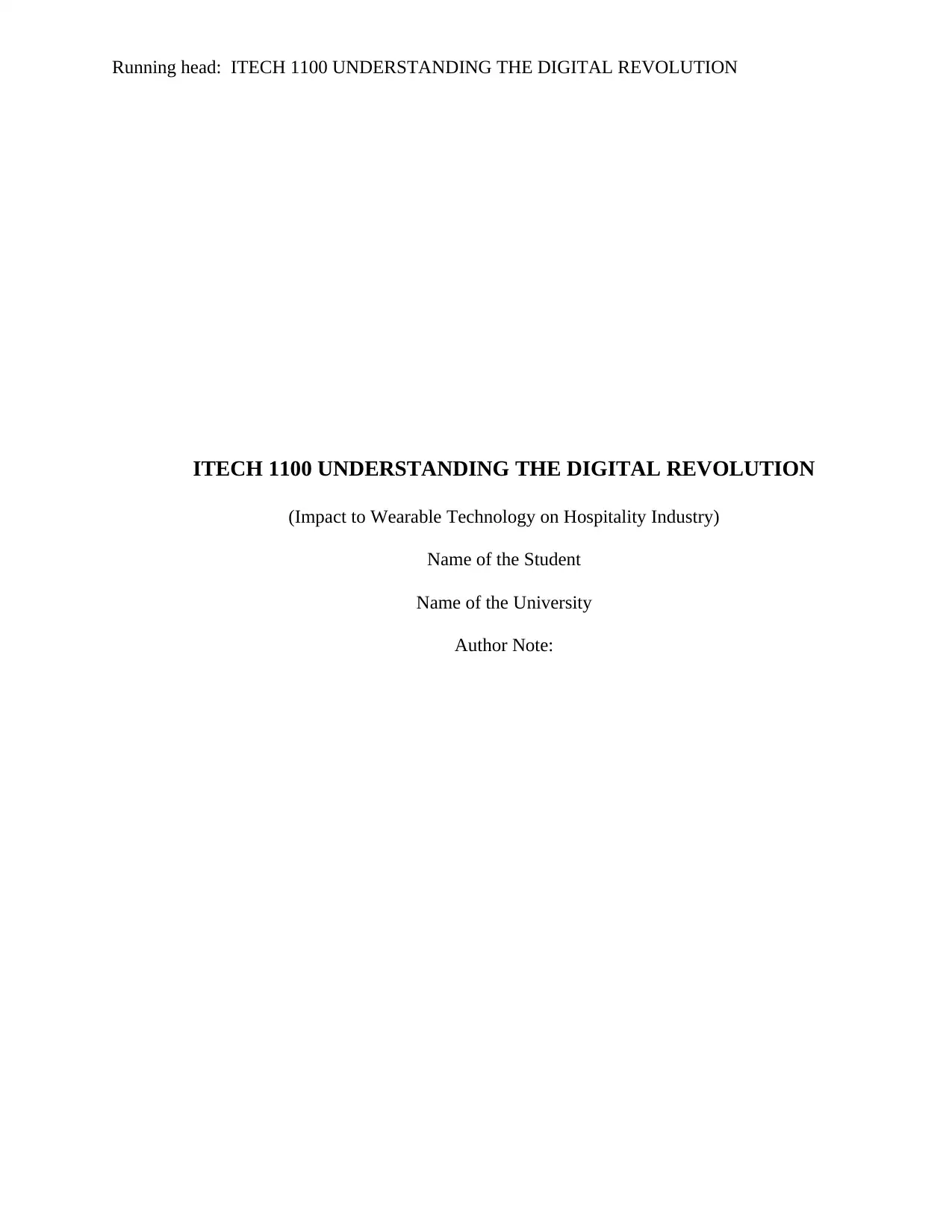
Running head: ITECH 1100 UNDERSTANDING THE DIGITAL REVOLUTION
ITECH 1100 UNDERSTANDING THE DIGITAL REVOLUTION
(Impact to Wearable Technology on Hospitality Industry)
Name of the Student
Name of the University
Author Note:
ITECH 1100 UNDERSTANDING THE DIGITAL REVOLUTION
(Impact to Wearable Technology on Hospitality Industry)
Name of the Student
Name of the University
Author Note:
Paraphrase This Document
Need a fresh take? Get an instant paraphrase of this document with our AI Paraphraser
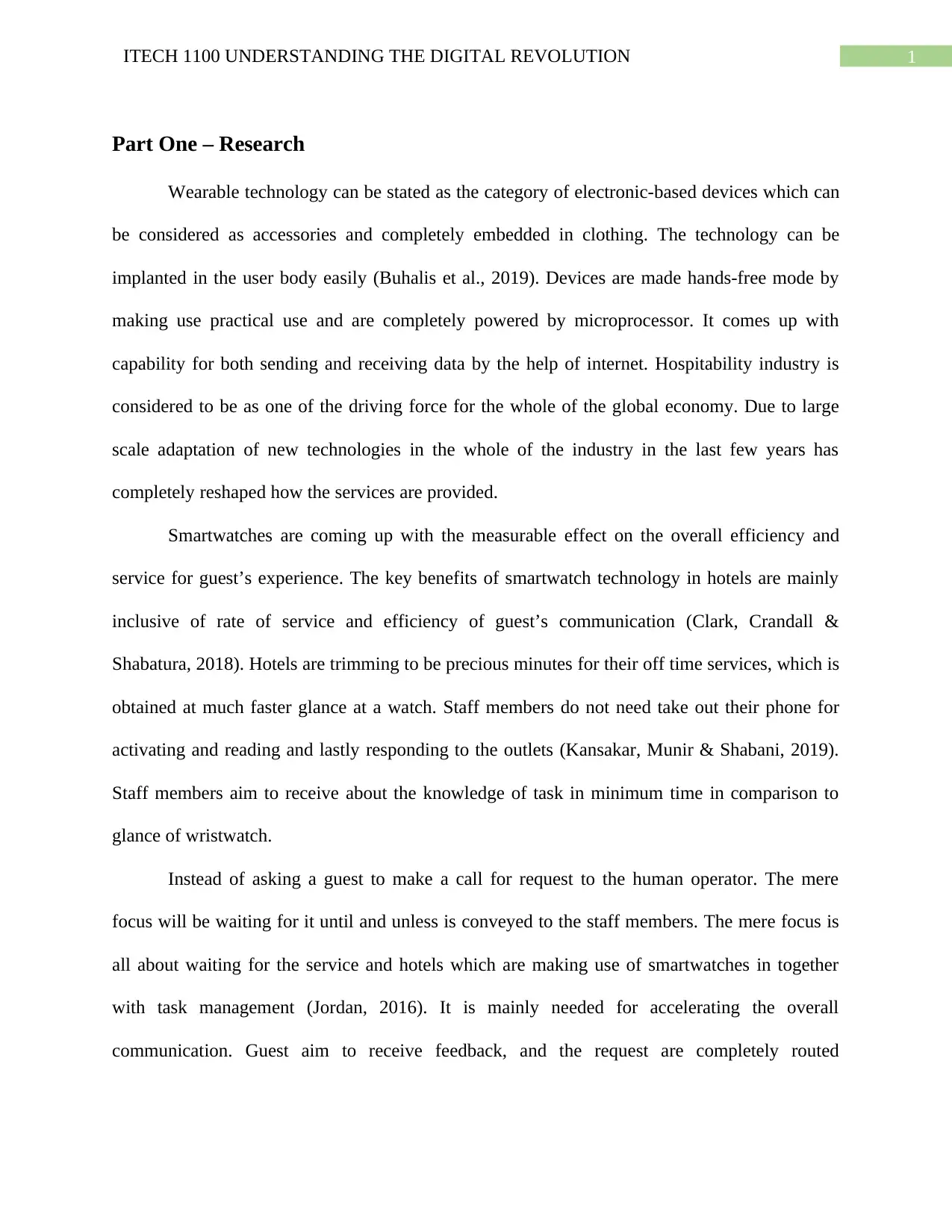
1ITECH 1100 UNDERSTANDING THE DIGITAL REVOLUTION
Part One – Research
Wearable technology can be stated as the category of electronic-based devices which can
be considered as accessories and completely embedded in clothing. The technology can be
implanted in the user body easily (Buhalis et al., 2019). Devices are made hands-free mode by
making use practical use and are completely powered by microprocessor. It comes up with
capability for both sending and receiving data by the help of internet. Hospitability industry is
considered to be as one of the driving force for the whole of the global economy. Due to large
scale adaptation of new technologies in the whole of the industry in the last few years has
completely reshaped how the services are provided.
Smartwatches are coming up with the measurable effect on the overall efficiency and
service for guest’s experience. The key benefits of smartwatch technology in hotels are mainly
inclusive of rate of service and efficiency of guest’s communication (Clark, Crandall &
Shabatura, 2018). Hotels are trimming to be precious minutes for their off time services, which is
obtained at much faster glance at a watch. Staff members do not need take out their phone for
activating and reading and lastly responding to the outlets (Kansakar, Munir & Shabani, 2019).
Staff members aim to receive about the knowledge of task in minimum time in comparison to
glance of wristwatch.
Instead of asking a guest to make a call for request to the human operator. The mere
focus will be waiting for it until and unless is conveyed to the staff members. The mere focus is
all about waiting for the service and hotels which are making use of smartwatches in together
with task management (Jordan, 2016). It is mainly needed for accelerating the overall
communication. Guest aim to receive feedback, and the request are completely routed
Part One – Research
Wearable technology can be stated as the category of electronic-based devices which can
be considered as accessories and completely embedded in clothing. The technology can be
implanted in the user body easily (Buhalis et al., 2019). Devices are made hands-free mode by
making use practical use and are completely powered by microprocessor. It comes up with
capability for both sending and receiving data by the help of internet. Hospitability industry is
considered to be as one of the driving force for the whole of the global economy. Due to large
scale adaptation of new technologies in the whole of the industry in the last few years has
completely reshaped how the services are provided.
Smartwatches are coming up with the measurable effect on the overall efficiency and
service for guest’s experience. The key benefits of smartwatch technology in hotels are mainly
inclusive of rate of service and efficiency of guest’s communication (Clark, Crandall &
Shabatura, 2018). Hotels are trimming to be precious minutes for their off time services, which is
obtained at much faster glance at a watch. Staff members do not need take out their phone for
activating and reading and lastly responding to the outlets (Kansakar, Munir & Shabani, 2019).
Staff members aim to receive about the knowledge of task in minimum time in comparison to
glance of wristwatch.
Instead of asking a guest to make a call for request to the human operator. The mere
focus will be waiting for it until and unless is conveyed to the staff members. The mere focus is
all about waiting for the service and hotels which are making use of smartwatches in together
with task management (Jordan, 2016). It is mainly needed for accelerating the overall
communication. Guest aim to receive feedback, and the request are completely routed
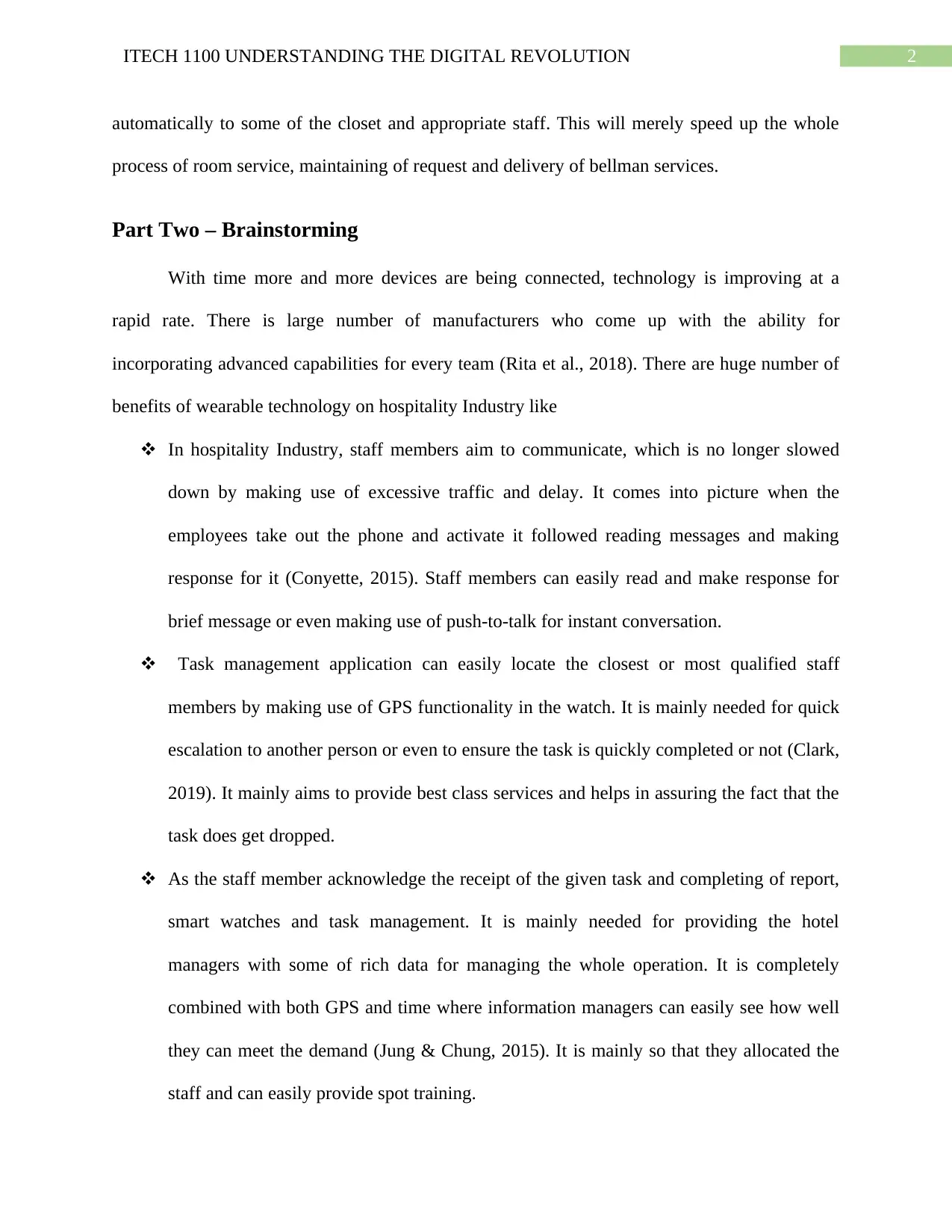
2ITECH 1100 UNDERSTANDING THE DIGITAL REVOLUTION
automatically to some of the closet and appropriate staff. This will merely speed up the whole
process of room service, maintaining of request and delivery of bellman services.
Part Two – Brainstorming
With time more and more devices are being connected, technology is improving at a
rapid rate. There is large number of manufacturers who come up with the ability for
incorporating advanced capabilities for every team (Rita et al., 2018). There are huge number of
benefits of wearable technology on hospitality Industry like
In hospitality Industry, staff members aim to communicate, which is no longer slowed
down by making use of excessive traffic and delay. It comes into picture when the
employees take out the phone and activate it followed reading messages and making
response for it (Conyette, 2015). Staff members can easily read and make response for
brief message or even making use of push-to-talk for instant conversation.
Task management application can easily locate the closest or most qualified staff
members by making use of GPS functionality in the watch. It is mainly needed for quick
escalation to another person or even to ensure the task is quickly completed or not (Clark,
2019). It mainly aims to provide best class services and helps in assuring the fact that the
task does get dropped.
As the staff member acknowledge the receipt of the given task and completing of report,
smart watches and task management. It is mainly needed for providing the hotel
managers with some of rich data for managing the whole operation. It is completely
combined with both GPS and time where information managers can easily see how well
they can meet the demand (Jung & Chung, 2015). It is mainly so that they allocated the
staff and can easily provide spot training.
automatically to some of the closet and appropriate staff. This will merely speed up the whole
process of room service, maintaining of request and delivery of bellman services.
Part Two – Brainstorming
With time more and more devices are being connected, technology is improving at a
rapid rate. There is large number of manufacturers who come up with the ability for
incorporating advanced capabilities for every team (Rita et al., 2018). There are huge number of
benefits of wearable technology on hospitality Industry like
In hospitality Industry, staff members aim to communicate, which is no longer slowed
down by making use of excessive traffic and delay. It comes into picture when the
employees take out the phone and activate it followed reading messages and making
response for it (Conyette, 2015). Staff members can easily read and make response for
brief message or even making use of push-to-talk for instant conversation.
Task management application can easily locate the closest or most qualified staff
members by making use of GPS functionality in the watch. It is mainly needed for quick
escalation to another person or even to ensure the task is quickly completed or not (Clark,
2019). It mainly aims to provide best class services and helps in assuring the fact that the
task does get dropped.
As the staff member acknowledge the receipt of the given task and completing of report,
smart watches and task management. It is mainly needed for providing the hotel
managers with some of rich data for managing the whole operation. It is completely
combined with both GPS and time where information managers can easily see how well
they can meet the demand (Jung & Chung, 2015). It is mainly so that they allocated the
staff and can easily provide spot training.
⊘ This is a preview!⊘
Do you want full access?
Subscribe today to unlock all pages.

Trusted by 1+ million students worldwide
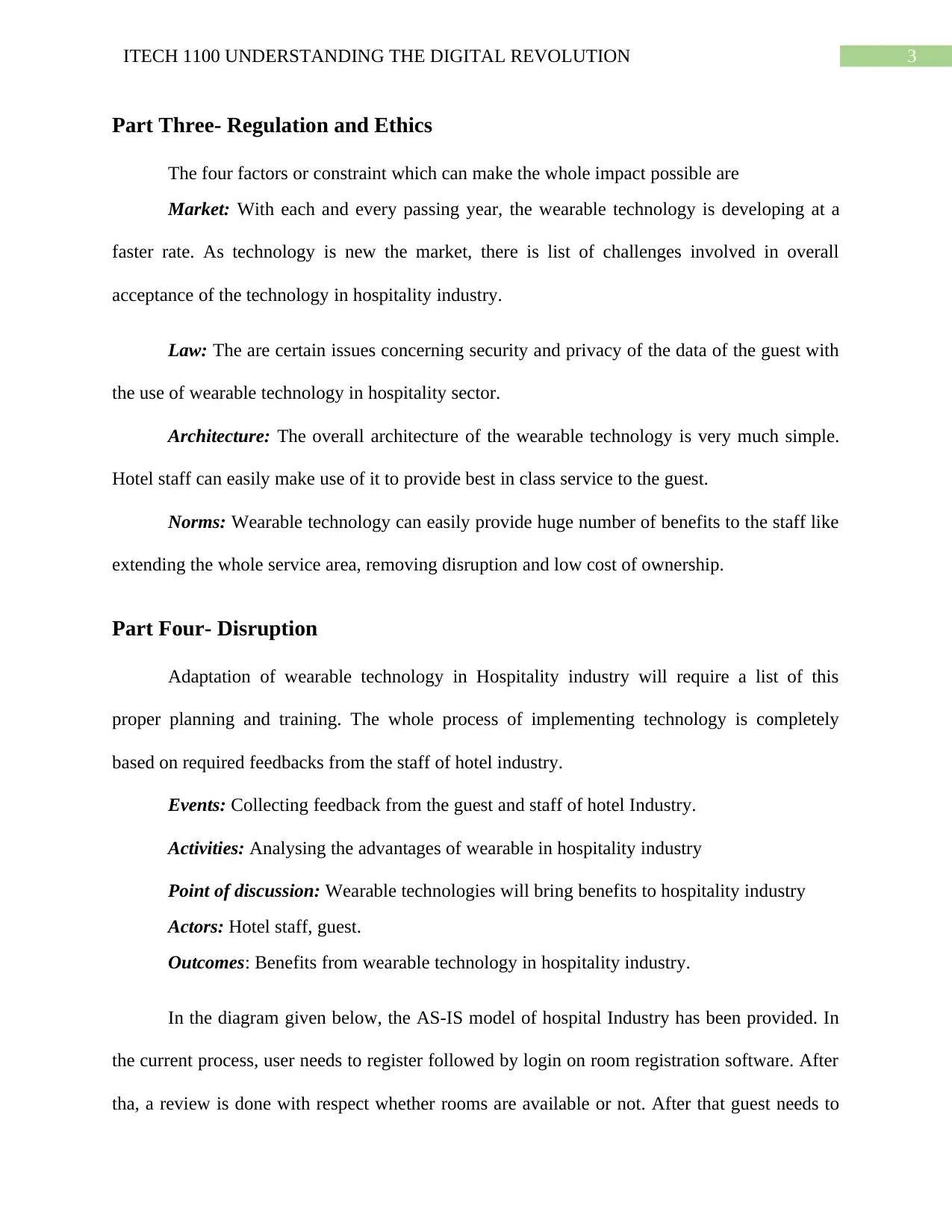
3ITECH 1100 UNDERSTANDING THE DIGITAL REVOLUTION
Part Three- Regulation and Ethics
The four factors or constraint which can make the whole impact possible are
Market: With each and every passing year, the wearable technology is developing at a
faster rate. As technology is new the market, there is list of challenges involved in overall
acceptance of the technology in hospitality industry.
Law: The are certain issues concerning security and privacy of the data of the guest with
the use of wearable technology in hospitality sector.
Architecture: The overall architecture of the wearable technology is very much simple.
Hotel staff can easily make use of it to provide best in class service to the guest.
Norms: Wearable technology can easily provide huge number of benefits to the staff like
extending the whole service area, removing disruption and low cost of ownership.
Part Four- Disruption
Adaptation of wearable technology in Hospitality industry will require a list of this
proper planning and training. The whole process of implementing technology is completely
based on required feedbacks from the staff of hotel industry.
Events: Collecting feedback from the guest and staff of hotel Industry.
Activities: Analysing the advantages of wearable in hospitality industry
Point of discussion: Wearable technologies will bring benefits to hospitality industry
Actors: Hotel staff, guest.
Outcomes: Benefits from wearable technology in hospitality industry.
In the diagram given below, the AS-IS model of hospital Industry has been provided. In
the current process, user needs to register followed by login on room registration software. After
tha, a review is done with respect whether rooms are available or not. After that guest needs to
Part Three- Regulation and Ethics
The four factors or constraint which can make the whole impact possible are
Market: With each and every passing year, the wearable technology is developing at a
faster rate. As technology is new the market, there is list of challenges involved in overall
acceptance of the technology in hospitality industry.
Law: The are certain issues concerning security and privacy of the data of the guest with
the use of wearable technology in hospitality sector.
Architecture: The overall architecture of the wearable technology is very much simple.
Hotel staff can easily make use of it to provide best in class service to the guest.
Norms: Wearable technology can easily provide huge number of benefits to the staff like
extending the whole service area, removing disruption and low cost of ownership.
Part Four- Disruption
Adaptation of wearable technology in Hospitality industry will require a list of this
proper planning and training. The whole process of implementing technology is completely
based on required feedbacks from the staff of hotel industry.
Events: Collecting feedback from the guest and staff of hotel Industry.
Activities: Analysing the advantages of wearable in hospitality industry
Point of discussion: Wearable technologies will bring benefits to hospitality industry
Actors: Hotel staff, guest.
Outcomes: Benefits from wearable technology in hospitality industry.
In the diagram given below, the AS-IS model of hospital Industry has been provided. In
the current process, user needs to register followed by login on room registration software. After
tha, a review is done with respect whether rooms are available or not. After that guest needs to
Paraphrase This Document
Need a fresh take? Get an instant paraphrase of this document with our AI Paraphraser
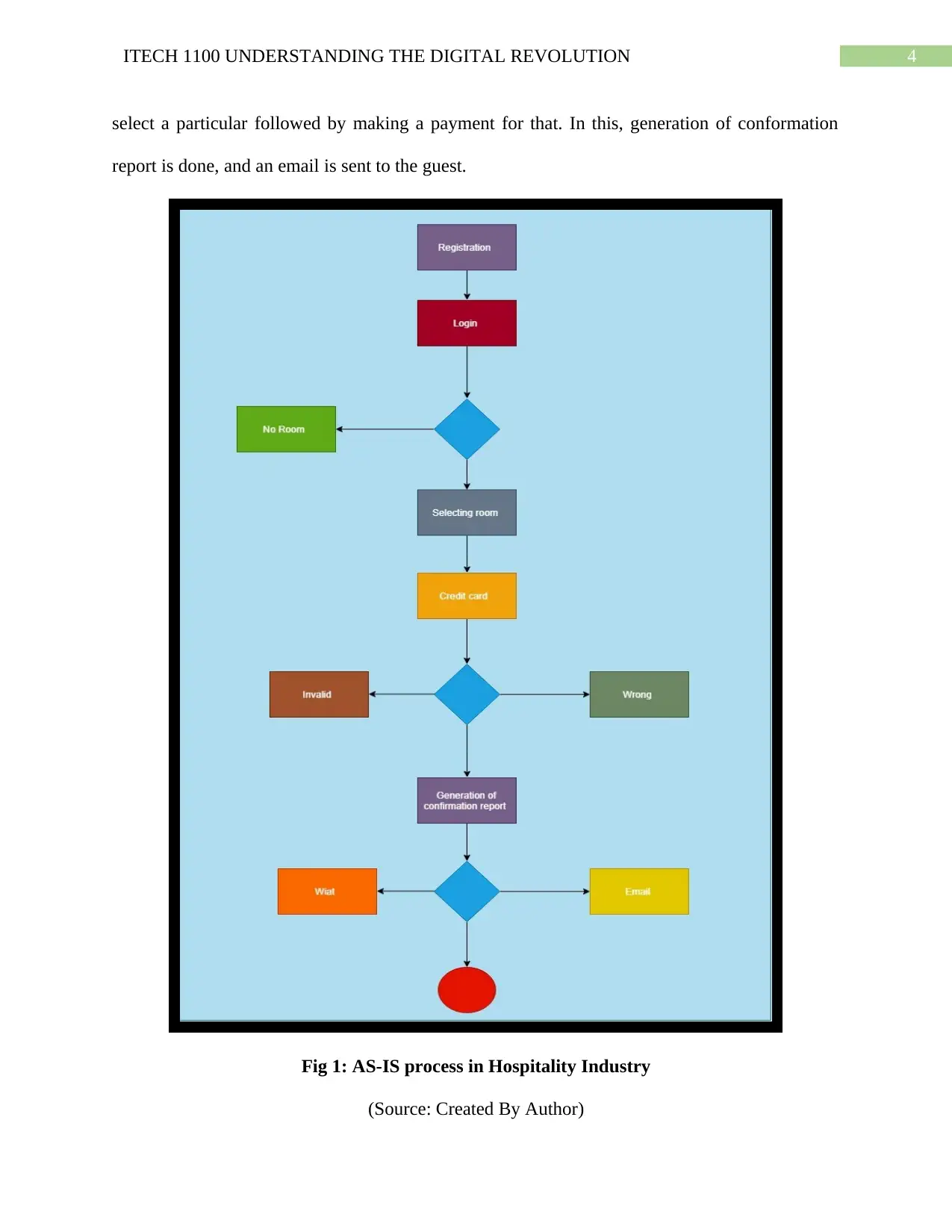
4ITECH 1100 UNDERSTANDING THE DIGITAL REVOLUTION
select a particular followed by making a payment for that. In this, generation of conformation
report is done, and an email is sent to the guest.
Fig 1: AS-IS process in Hospitality Industry
(Source: Created By Author)
select a particular followed by making a payment for that. In this, generation of conformation
report is done, and an email is sent to the guest.
Fig 1: AS-IS process in Hospitality Industry
(Source: Created By Author)
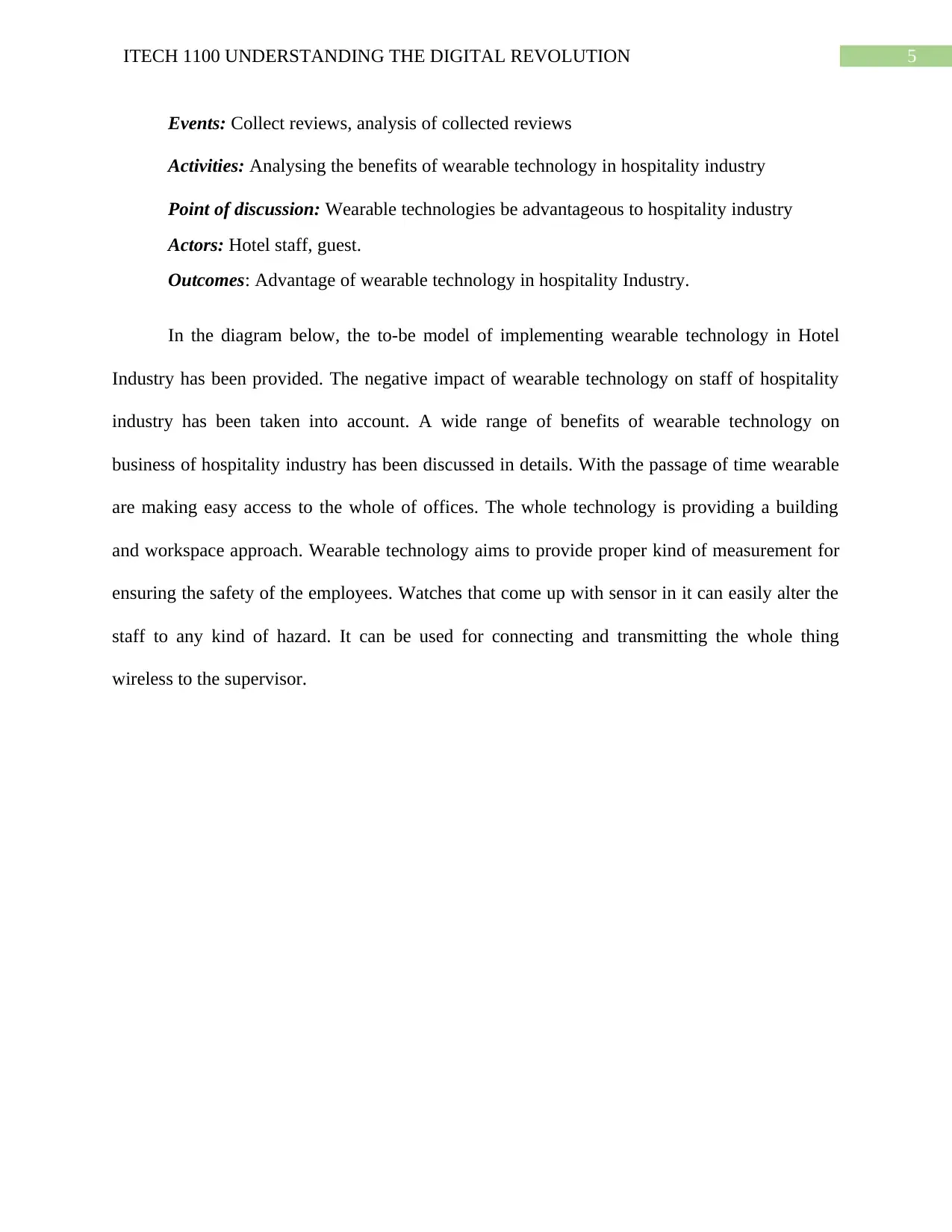
5ITECH 1100 UNDERSTANDING THE DIGITAL REVOLUTION
Events: Collect reviews, analysis of collected reviews
Activities: Analysing the benefits of wearable technology in hospitality industry
Point of discussion: Wearable technologies be advantageous to hospitality industry
Actors: Hotel staff, guest.
Outcomes: Advantage of wearable technology in hospitality Industry.
In the diagram below, the to-be model of implementing wearable technology in Hotel
Industry has been provided. The negative impact of wearable technology on staff of hospitality
industry has been taken into account. A wide range of benefits of wearable technology on
business of hospitality industry has been discussed in details. With the passage of time wearable
are making easy access to the whole of offices. The whole technology is providing a building
and workspace approach. Wearable technology aims to provide proper kind of measurement for
ensuring the safety of the employees. Watches that come up with sensor in it can easily alter the
staff to any kind of hazard. It can be used for connecting and transmitting the whole thing
wireless to the supervisor.
Events: Collect reviews, analysis of collected reviews
Activities: Analysing the benefits of wearable technology in hospitality industry
Point of discussion: Wearable technologies be advantageous to hospitality industry
Actors: Hotel staff, guest.
Outcomes: Advantage of wearable technology in hospitality Industry.
In the diagram below, the to-be model of implementing wearable technology in Hotel
Industry has been provided. The negative impact of wearable technology on staff of hospitality
industry has been taken into account. A wide range of benefits of wearable technology on
business of hospitality industry has been discussed in details. With the passage of time wearable
are making easy access to the whole of offices. The whole technology is providing a building
and workspace approach. Wearable technology aims to provide proper kind of measurement for
ensuring the safety of the employees. Watches that come up with sensor in it can easily alter the
staff to any kind of hazard. It can be used for connecting and transmitting the whole thing
wireless to the supervisor.
⊘ This is a preview!⊘
Do you want full access?
Subscribe today to unlock all pages.

Trusted by 1+ million students worldwide
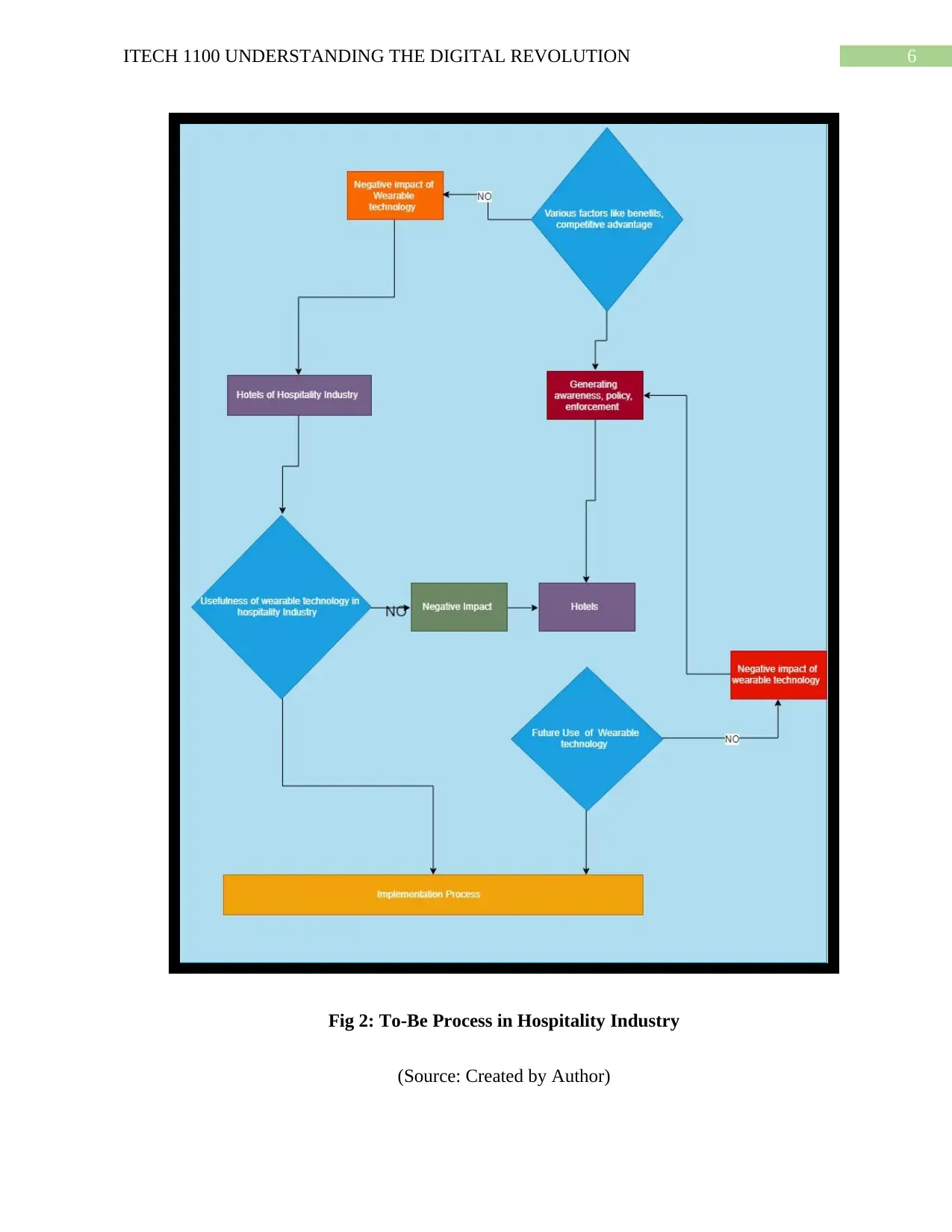
6ITECH 1100 UNDERSTANDING THE DIGITAL REVOLUTION
Fig 2: To-Be Process in Hospitality Industry
(Source: Created by Author)
Fig 2: To-Be Process in Hospitality Industry
(Source: Created by Author)
Paraphrase This Document
Need a fresh take? Get an instant paraphrase of this document with our AI Paraphraser
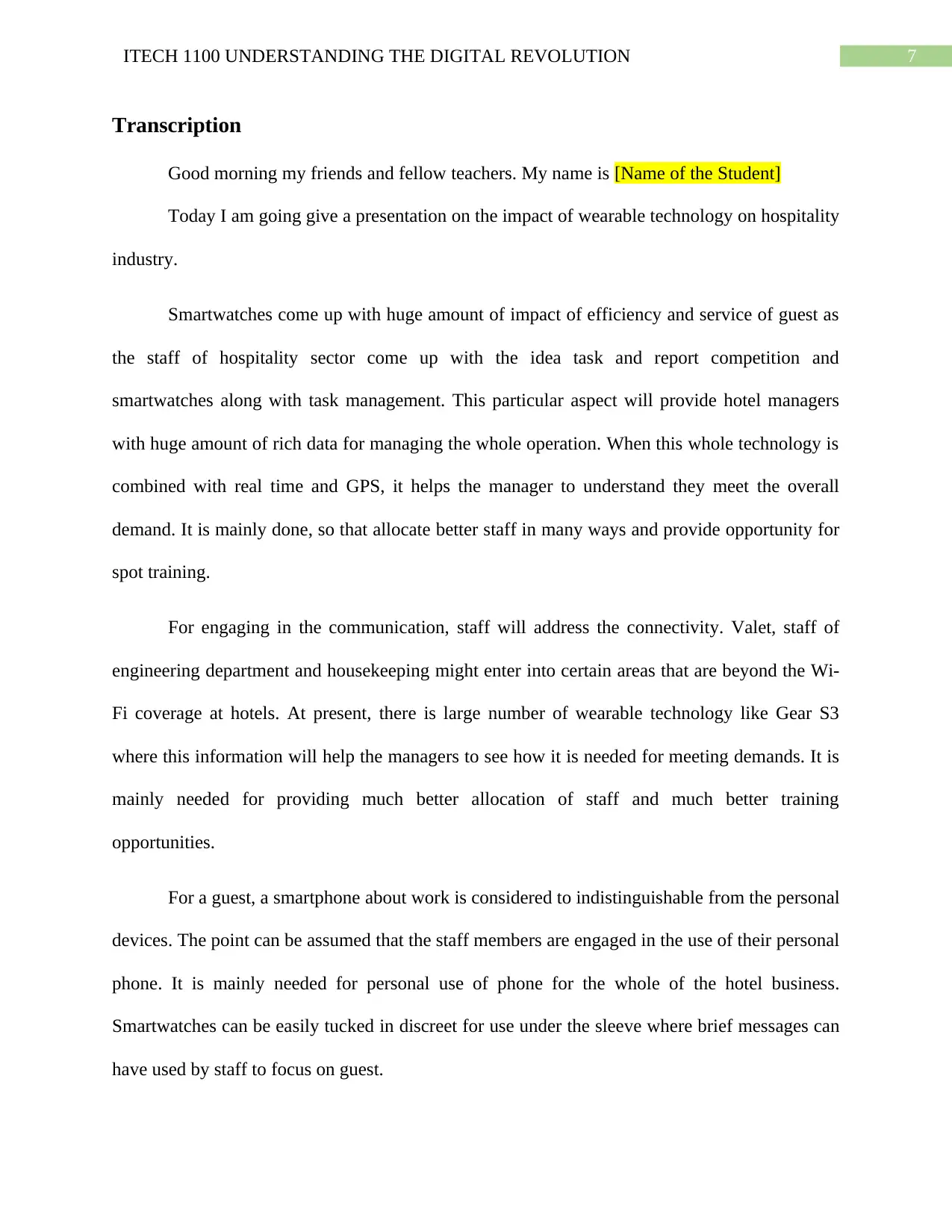
7ITECH 1100 UNDERSTANDING THE DIGITAL REVOLUTION
Transcription
Good morning my friends and fellow teachers. My name is [Name of the Student]
Today I am going give a presentation on the impact of wearable technology on hospitality
industry.
Smartwatches come up with huge amount of impact of efficiency and service of guest as
the staff of hospitality sector come up with the idea task and report competition and
smartwatches along with task management. This particular aspect will provide hotel managers
with huge amount of rich data for managing the whole operation. When this whole technology is
combined with real time and GPS, it helps the manager to understand they meet the overall
demand. It is mainly done, so that allocate better staff in many ways and provide opportunity for
spot training.
For engaging in the communication, staff will address the connectivity. Valet, staff of
engineering department and housekeeping might enter into certain areas that are beyond the Wi-
Fi coverage at hotels. At present, there is large number of wearable technology like Gear S3
where this information will help the managers to see how it is needed for meeting demands. It is
mainly needed for providing much better allocation of staff and much better training
opportunities.
For a guest, a smartphone about work is considered to indistinguishable from the personal
devices. The point can be assumed that the staff members are engaged in the use of their personal
phone. It is mainly needed for personal use of phone for the whole of the hotel business.
Smartwatches can be easily tucked in discreet for use under the sleeve where brief messages can
have used by staff to focus on guest.
Transcription
Good morning my friends and fellow teachers. My name is [Name of the Student]
Today I am going give a presentation on the impact of wearable technology on hospitality
industry.
Smartwatches come up with huge amount of impact of efficiency and service of guest as
the staff of hospitality sector come up with the idea task and report competition and
smartwatches along with task management. This particular aspect will provide hotel managers
with huge amount of rich data for managing the whole operation. When this whole technology is
combined with real time and GPS, it helps the manager to understand they meet the overall
demand. It is mainly done, so that allocate better staff in many ways and provide opportunity for
spot training.
For engaging in the communication, staff will address the connectivity. Valet, staff of
engineering department and housekeeping might enter into certain areas that are beyond the Wi-
Fi coverage at hotels. At present, there is large number of wearable technology like Gear S3
where this information will help the managers to see how it is needed for meeting demands. It is
mainly needed for providing much better allocation of staff and much better training
opportunities.
For a guest, a smartphone about work is considered to indistinguishable from the personal
devices. The point can be assumed that the staff members are engaged in the use of their personal
phone. It is mainly needed for personal use of phone for the whole of the hotel business.
Smartwatches can be easily tucked in discreet for use under the sleeve where brief messages can
have used by staff to focus on guest.
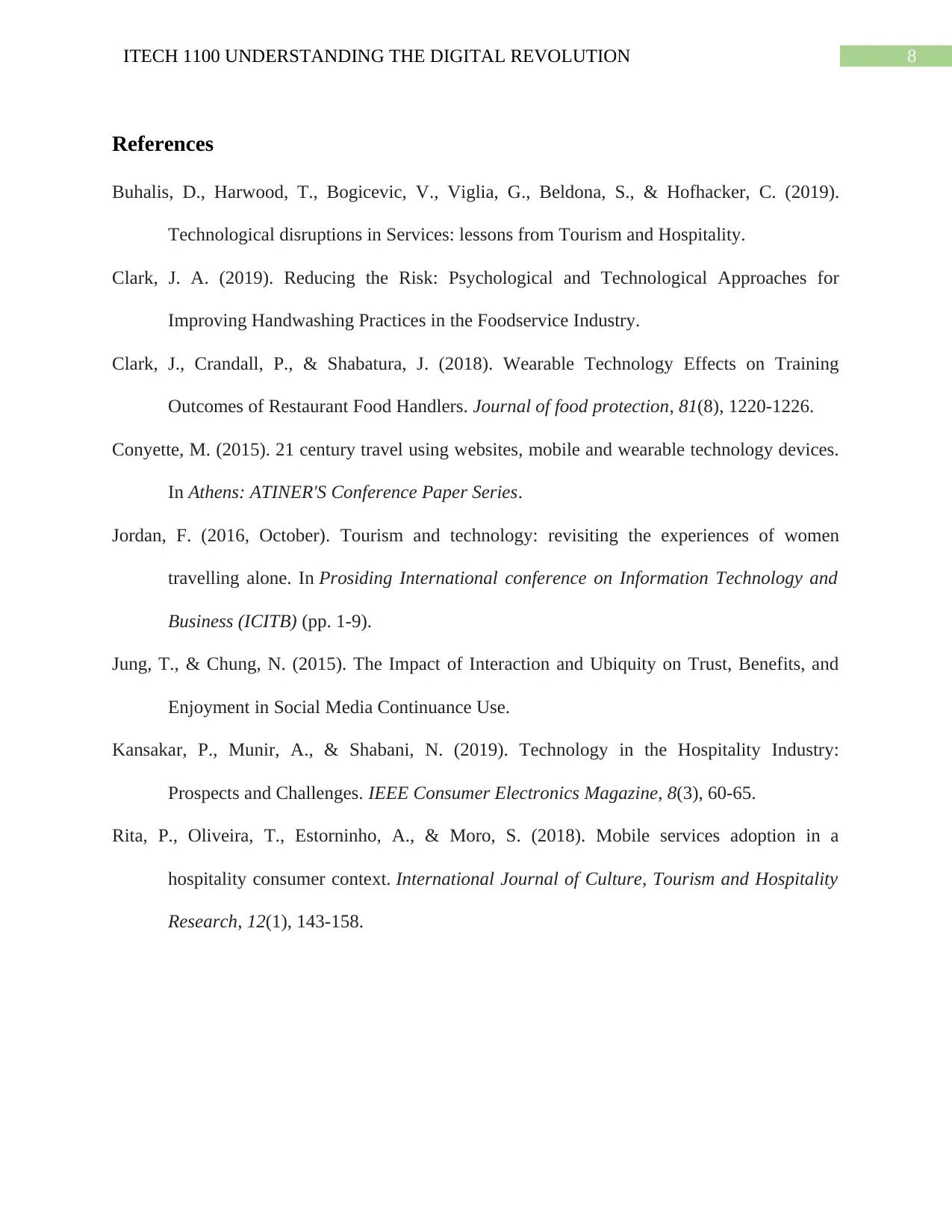
8ITECH 1100 UNDERSTANDING THE DIGITAL REVOLUTION
References
Buhalis, D., Harwood, T., Bogicevic, V., Viglia, G., Beldona, S., & Hofhacker, C. (2019).
Technological disruptions in Services: lessons from Tourism and Hospitality.
Clark, J. A. (2019). Reducing the Risk: Psychological and Technological Approaches for
Improving Handwashing Practices in the Foodservice Industry.
Clark, J., Crandall, P., & Shabatura, J. (2018). Wearable Technology Effects on Training
Outcomes of Restaurant Food Handlers. Journal of food protection, 81(8), 1220-1226.
Conyette, M. (2015). 21 century travel using websites, mobile and wearable technology devices.
In Athens: ATINER'S Conference Paper Series.
Jordan, F. (2016, October). Tourism and technology: revisiting the experiences of women
travelling alone. In Prosiding International conference on Information Technology and
Business (ICITB) (pp. 1-9).
Jung, T., & Chung, N. (2015). The Impact of Interaction and Ubiquity on Trust, Benefits, and
Enjoyment in Social Media Continuance Use.
Kansakar, P., Munir, A., & Shabani, N. (2019). Technology in the Hospitality Industry:
Prospects and Challenges. IEEE Consumer Electronics Magazine, 8(3), 60-65.
Rita, P., Oliveira, T., Estorninho, A., & Moro, S. (2018). Mobile services adoption in a
hospitality consumer context. International Journal of Culture, Tourism and Hospitality
Research, 12(1), 143-158.
References
Buhalis, D., Harwood, T., Bogicevic, V., Viglia, G., Beldona, S., & Hofhacker, C. (2019).
Technological disruptions in Services: lessons from Tourism and Hospitality.
Clark, J. A. (2019). Reducing the Risk: Psychological and Technological Approaches for
Improving Handwashing Practices in the Foodservice Industry.
Clark, J., Crandall, P., & Shabatura, J. (2018). Wearable Technology Effects on Training
Outcomes of Restaurant Food Handlers. Journal of food protection, 81(8), 1220-1226.
Conyette, M. (2015). 21 century travel using websites, mobile and wearable technology devices.
In Athens: ATINER'S Conference Paper Series.
Jordan, F. (2016, October). Tourism and technology: revisiting the experiences of women
travelling alone. In Prosiding International conference on Information Technology and
Business (ICITB) (pp. 1-9).
Jung, T., & Chung, N. (2015). The Impact of Interaction and Ubiquity on Trust, Benefits, and
Enjoyment in Social Media Continuance Use.
Kansakar, P., Munir, A., & Shabani, N. (2019). Technology in the Hospitality Industry:
Prospects and Challenges. IEEE Consumer Electronics Magazine, 8(3), 60-65.
Rita, P., Oliveira, T., Estorninho, A., & Moro, S. (2018). Mobile services adoption in a
hospitality consumer context. International Journal of Culture, Tourism and Hospitality
Research, 12(1), 143-158.
⊘ This is a preview!⊘
Do you want full access?
Subscribe today to unlock all pages.

Trusted by 1+ million students worldwide
1 out of 9
Related Documents
Your All-in-One AI-Powered Toolkit for Academic Success.
+13062052269
info@desklib.com
Available 24*7 on WhatsApp / Email
![[object Object]](/_next/static/media/star-bottom.7253800d.svg)
Unlock your academic potential
Copyright © 2020–2025 A2Z Services. All Rights Reserved. Developed and managed by ZUCOL.





